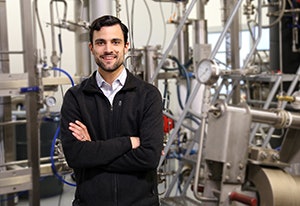

When Nicolas Guarino left college in 2017, he leveraged his family’s six generations of agricultural experience to launch a business under New York’s Industrial Hemp Research Initiative.
Now the co-founder and CEO of Naturae, which holds licenses to cultivate, process, manufacture and distribute adult-use cannabis in the Empire State, Guarino initially launched the company in the nonpsychoactive cannabinoid space.
Guarino and his team proved themselves in the tumultuous CBD market, where he says oil prices dropped from roughly $5,000 per kilogram when the business launched in 2017 to $50 per kilogram when Naturae stopped producing CBD in 2022.
The struggle of reducing overhead costs and downsizing staff while increasing production and selling end products at lower price points prepared Guarino for his next business venture in New York’s emerging adult-use cannabis market.
Gov. Kathy Hochul signed legislation into law last year that allowed the state’s licensed hemp farmers to apply for permits to grow cannabis for the forthcoming adult-use market, which former Gov. Andrew Cuomo signed into law in 2021.
With CBD prices plummeting, Guarino jumped at the chance to transform his roughly 35 acres of land from outdoor hemp to outdoor cannabis production.
“Going through all of that struggle and then finally getting this opportunity of being first in line to open the market was, at the time, … just incredibly exciting,” he says.
Now, with only 18 brick-and-mortar cannabis retailers open in the state and many more struggling to open under a “Seeding Opportunity Initiative” that prioritized applicants with past cannabis-related convictions in the licensing process, Guarino says the distressed farmers and social equity retailers that regulators tried to help are the ones suffering most.
“It's been essentially massive overproduction and not enough outlets to sell that out of,” he says. “And then, of course, there are a few sub-issues there within the retail side of the industry, which are the unlicensed shops [and] the lack of funding to pay for product to stock dispensaries’ shelves.”
RELATED: ‘The Lost Year’: New York’s Adult-Use Cannabis Industry Grapples With Sluggish Rollout
Guarino says the production side of the supply chain has lived up to its end of the deal and provided the crops necessary to produce enough product to meet market demand.
Naturae primarily produces extracts, and Guarino says the company has struggled to generate enough revenue to pay its stakeholders.
“We have six cultivation partners and we’ve been able to pay them, thankfully, because we originally got some investment to pay them before stores even opened,” he says. “Then we had enough sales that still, we’ve had to extend terms, … but thankfully, they’re very happy because they see the rest of the market, [where] there's no revenue, there's nowhere to pay the bills from.”

Last year, during Naturae’s first year of adult-use cannabis cultivation and processing, the company had seven cultivation partners supplying wholesale cannabis for its extracts. This year, in its second year of adult-use operations, Naturae has eliminated five of those contracts and only retained two cultivation partners.
“We currently have an overstock from the last season of oil,” Guarino says. “So, right away, that's a big decision that we had to make.”
Naturae has been able to develop its product portfolio over the past year, however, growing from seven to 30 SKUs.
“[We’ve] been having to cut agricultural production and investment, increase the product line, and solidify our distribution infrastructure, which is an opportunity we didn't think we were going to have, really,” Guarino says. “We thought we were going to be forced into working with a third party because of the immediate scale, but we’ve been able to hold our own pretty comfortably and develop systems now that we think can handle up to 400 stores under a self-distribution model versus previously thinking 50 stores.”
‘A Death Blow to the Entire Conditional Program’
While Naturae has been able to carve out a place in the market the past two years, Guarino says recent litigation, which has resulted in a court order blocking regulators from issuing new retail licenses and approving new dispensary openings, could be “a death blow to the entire conditional program.”
A group of service-disabled veterans sued the state last month, arguing that the New York Office of Cannabis Management (OCM) violated state law when it excluded them and other groups from adult-use cannabis licensing opportunities.
An Aug. 7 court order stemming from the litigation blocked state regulators from moving forward with approvals for additional licenses and dispensary openings, meaning that all Conditional Adult-Use Retail Dispensary (CAURD) licensees who have not yet opened their businesses are in limbo until the case is resolved.
RELATED: New York Court Reverses Order, Leaving 30 Dispensaries Previously Approved Back in Limbo
Meanwhile, the adult-use licensing scheme originally shut out—at least for the immediate future—New York’s 10 existing medical cannabis operators, called “registered organizations” (ROs). Those licensed under the CAURD program were given three years under the original statute to find their footing in the marker before ROs could expand to adult-use sales, meaning that December 2025 was the earliest any of those businesses could serve adult-use customers.
However, The OCM hatched a plan in May to allow ROs to expand up to three of their retail locations to adult-use sales, including a first site in December 2023—two years before originally proposed. These revised regulations were officially approved at the OCM’s Sept. 12 board meeting, where regulators also announced that they will launch an application round for all businesses on Oct. 4.
“I think what they’re doing is the only thing to do right now because the program is totally out of compliance with what the [Marijuana Regulation and Taxation Act (MRTA)] said,” Guarino says. “That’s why the judge was fairly impartial. The judge just had to do what he had to do with the law in front of him. So, I think the only thing they could do is what they’re doing, which is open up the licensing process as quickly as possible. And the most important thing would be that they approve those applications as quickly as they can after the waiting period.”
High-Quality Extracts
While the courts and the regulators work to mend New York’s crumbling adult-use cannabis program, Guarino is focused on what he does best: high-quality cannabis extracts.
“We’ve been extractors for a very, very long time,” he says. “And because of that, we’re able to make very high-quality oil in the different extraction types that we use. And at the same time, … we’re doing it very efficiently and with our own raw inputs. It’s really the quality and the price that we can offer for extract-based products that most differentiates us. We have among the best pricing in the market right now, very close to the unlicensed market, which is something we’re proud of. We’re always trying to be as close as we can, even with our tax considerations, to the unlicensed market so that we can bring more people into the legal market.”
Naturae also sets itself apart in the market through its delivery service; the company delivers the next day (as long as orders are received by 4:20 p.m.) to almost every location in the state.
“New York is definitely super exciting,” Guarino says. “It’s by all accounts the largest cannabis market in the entire world. … There’s such a New York spirit about the brands and there’s an opportunity to build a whole new set of cannabis brands that are East Coast-based and that have their own important reputation, versus a lot of the big West Coast brands that are trying to penetrate in here. And there seems to be the environment for it. … All the stores want New York brands. They’re excited about the improvements in New York brands. They understand that we don’t have 10 years of iteration yet, but that we’re getting there and we’re working super hard on it. So, I would say that there’s an opportunity to actually build consumer brands in cannabis, [and New York] is probably the last big state to be able to do it in."
























